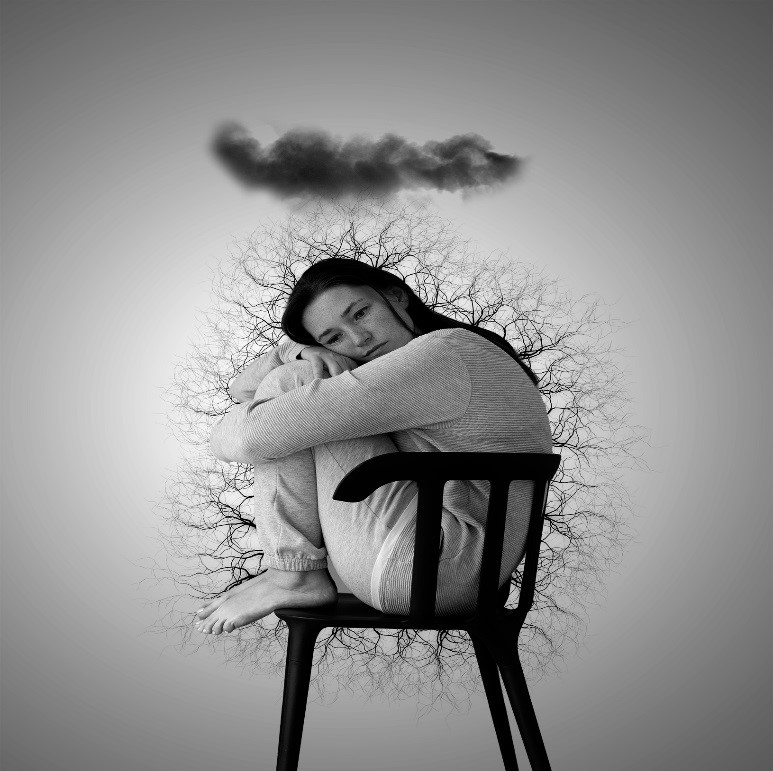DEPRESSION IS MORE THAN JUST SADNESS

"A human being can survive almost anything as long as they can see the end. But depression is so insidious, it's impossible to see the end"
-Elizabeth Wurtzel
Sadness and depression are both related to mental well-being, though sometimes used interchangeably; one is an emotional state, while the other is an illness. Understanding these differences is crucial as it empowers you to recognize when you or someone you know might need help.
Sadness is a natural response to adversity or loss, characterized by typical facial expressions, social withdrawal , sorrow, or grief. It is usually transient, with emotions easing as circumstances improve or are processed emotionally. This transient nature of sadness should give you hope that it will pass. In contrast, depression is a serious mental health condition marked by prolonged feelings of sadness, hopelessness, and disinterest in daily activities.
CAN I BECOME DEPRESSED IF I DON’T DEAL WITH MY SADNESS?
One study suggests that moods in clinical depression are far more unstable and uncontrollable than in sadness. Clarifying that if depression was only extreme sadness, then patients would have more control over symptoms, which is not seen in cases of depression as patients find it almost impossible to snap out of the dark spirals of thoughts.
While sadness is indeed a common symptom of depression, prolonged experiences of sadness can lead to profound, lasting effects. It's essential to recognize that a wide range of factors contribute to the onset of depression and other mental health disorders.
HOW DEPRESSION DIFFERS FROM SADNESS?
While sadness often has a clear cause, depression can arise from a combination of factors, including genetic predisposition, biological differences in brain chemistry, hormonal changes, trauma, stress, anxiety and certain medical conditions
Some key aspects that differentiate depression from mere sadness include:
- Duration: Sadness is typically temporary and often triggered by a specific event or situation, whereas depression persists for weeks, months, or even years.
- Intensity: While sadness is a normal emotion and part of being human, depression is a serious mental health condition that is intense and affects a person's thoughts, feelings, and behavior. Depression hits a person in a profound and often prolonged way, often leading to suicidal thoughts and actions.
- Impact on daily life: Depression can significantly impair a person's ability to function in their daily life, affecting relationships, work or academic performance, and overall quality of life. It can also lead to physical symptoms such as headaches, insomnia , digestive issues, or chronic pain.
MANAGEMENT OF SADNESS AND DEPRESSION:
There is compelling evidence that individuals who cultivate resilience can navigate their emotions, including sadness. These individuals demonstrate emotional intelligence , mindfulness , and a reduced risk of developing illnesses like depression. Unlike sadness, which improves with time or supportive interventions, depression often requires treatment such as psychotherapy, medication, or a combination of both.
It's advisable to reach out for help soon while feeling the symptoms of depression, as they carry the chance of deterioration. It's essential for individuals experiencing symptoms of depression to seek support from professionals and makes it easier to deal with depression.
In 2024, research showed that depression is a highly prevalent disorder, making cognitive behavioral therapy (CBT) an incredibly effective treatment option. CBT assists patients in managing their rumination, which helps prevent relapses and makes it easier to let go of the pain. In contrast, antidepressant medications are generally recommended to relieve the undesirable symptoms of depression.
A WORD FROM MENTAL NURTURING:
To conclude, depression transcends mere sadness; it permeates every aspect of life, clouding thoughts, emotions, and actions. Unlike fleeting sadness, depression lingers persistently, impacting one's ability to function, work, and maintain relationships. It's a complex interplay of biological, psychological, and social factors, often requiring professional intervention for effective management.
Remember, seeking help is a sign of strength, not weakness.
Understanding depression demands empathy and self-awareness, as it affects millions worldwide, highlighting the critical need for compassion and practical support systems. The considerable role of genetics in the development of mental health disorders is widely studied. Major depressive disorder can manifest as different combinations of symptoms, ranging from a profound sadness to a loss of interest in daily life to an inability to engage in effortful, goal-directed behavior. As a mental health advocate, I encourage everyone to prioritize their mental well-being and to seek professional help when needed. By taking proactive steps and seeking help early, you can regain control over your mental health and break the stigma surrounding mental illness.
RESOURCES:
1. Mouchet-Mages S, Baylé FJ. Sadness is an integral part of depression. Dialogues Clin Neurosci. 2008;10(3):321-7. doi: 10.31887/DCNS.2008.10.3/smmages. PMID: 18979945; PMCID: PMC3181878.
2. Schulz D. Depression development: From lifestyle changes to motivational deficits. Behav Brain Res. 2020 Oct 1;395:112845. doi: 10.1016/j.bbr.2020.112845. Epub 2020 Aug 3. PMID: 32758506.
3. Bowen R, Peters E, Marwaha S, Baetz M, Balbuena L. Moods in Clinical Depression Are More Unstable than Severe Normal Sadness. Front Psychiatry. 2017 Apr 12;8:56. doi: 10.3389/fpsyt.2017.00056. PMID: 28446884; PMCID: PMC5388683.
4. Post RJ, Warden MR. Depression: the search for separable behaviors and circuits. Curr Opin Neurobiol. 2018 Apr;49:192-200. doi: 10.1016/j.conb.2018.02.018. Epub 2018 Mar 9. PMID: 29529482; PMCID: PMC6042519.
5. https://www.sciencedirect.com/science/article/abs/pii/S0149763416300653

Written By:
Rumsha Abdul Aziz, MS Psychology
On July 25, 2024

